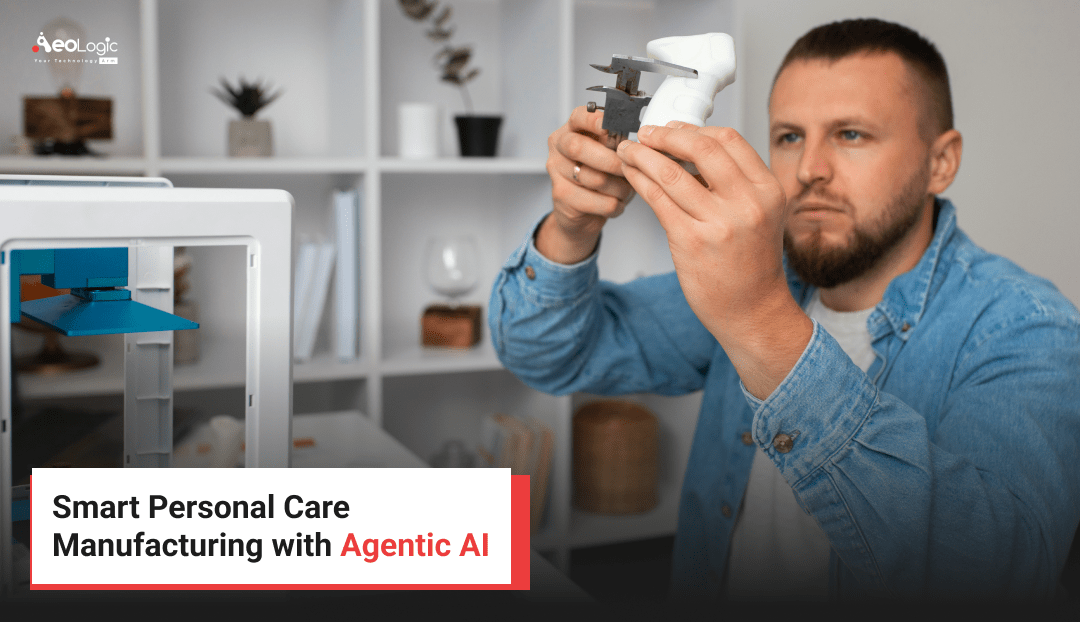The personal care sector is developing fast based on rising consumer demands of the personal, sustainable, and effective nature of products. Demand has been rising around custom-formulated products of high quality and by this, more pressure is previously exerted on manufacturers to innovate and be efficient and cost-saving. Here, agentic AI becomes a revolutionizing game changer – not only the aiding factor in decision making but on its own, it is arriving to optimize processes in research, development, production, and supply chains. As a specialized vertical, personal care AI is redefining how brands conceive, produce, and deliver personal hygiene, skincare, and grooming products at scale. This article explores how agentic AI agency systems are reshaping smart personal care manufacturing and enabling a more responsive, intelligent, and sustainable industry.
The Personal Care Industry Shift Knowledge
The personal care industry covers a wide variety or products which take the form of skincare, grooming, haircare, oral hygiene and deodorants. Consumer preferences, regulatory and technological changes have a significant impact in this market. The Demographic and lifestyle changes of the past ten years have manifested itself into a dramatic one:
- The consumers today have shifted to favoring natural, clean labels and sustainable ingredients.
- One notes increasing demand for customized products according to skin type, genetics and lifestyle.
- The international supply networks are becoming more and more complicated and subject to upset.
- Regulations are getting restructured to provide safety and tranquility.
Such demands tend to hamper the conventional manufacturing paradigms. R&D activities are fixed, manufacturing is rigid, and old supply chains cannot cope up. Enter personal care AI and the emergence of autonomous, intelligent agents that drive a new era of operational excellence.
What Is Agentic AI and Why It Matters
The agentic AI is an AI with agency; which is able to make decisions. In contrast to customary AI that merely proposes recommendations, agentic AI is able to sense, learn, and act on things in the engulfing environment without the need of any human interference. By definition, the word agentic connotes pro-activeness, being adaptable, and extraordinarily independent in performance.
When implemented through an agentic AI agency, these intelligent agents:
- Process intricate data in real-time
- Forecast changes in direction and results
- Dynamically re-engineer processes
- Automatically find best performance
When speaking of artificial intelligence in the area of smart personal care manufacturing, these systems become digital overseers that coordinate R&D, predict the demand of ingredients, optimize production lines, and even speak with suppliers on their own.
How Personal Care AI Transforms the Product Lifecycle
The integration of personal care AI fundamentally enhances every stage of the product lifecycle. AI agents are enhancing efficiency, speed and product quality, at the concept ideation as well as the delivery of the products to the consumer. Here’s how:
1. Smart Product Ideation
An AI-based tool can be used to combine information in dermatological research, customer reviews, market trends analysis, and social media to draw areas of market insufficiency. By leveraging natural language processing and machine learning, personal care AI tools spot emerging preferences (like microbiome-friendly or blue-light-blocking skincare) before they go mainstream.
An agentic AI agency can automate competitive analysis and ideation workflows, allowing R&D teams to move faster and focus on high-impact innovation.
2. Intelligent formulation Engines
Artificial intelligence would be able to model thousands of combinations of ingredients and estimate their interactions, so it would be less time-consuming and limitless trial-and-error syndrome.
- An advanced personal care AI platform, backed by agentic intelligence, can:
- Give alternative ingredients when supplies are insufficient
- Virtual environment test formulations
- Confirm the compliance of products with world compliance databases
These characteristics do not only enhance rapid growth but also a guarantee that the end products are efficient and meet international standards.
3. People-Less Manufacturing Activity
Smart factories powered by agentic AI agency systems are redefining manufacturing floors. These AI agents observe real-time metrics in production lines resulting in dynamic control of variables to ensure optimum throughput and minimized wastage. They also have the capability to forecast equipment failures, begin maintenance procedures, and even modify batch quantities with regard to the demand or the supply of raw materials.
In the case of a sudden jump in demand of a moisturizer because of some sort of viral jump, the AI could allocate some production capacity to the SKU, restocking ingredients, and rearranging logistics all automatically.
Industrial-scale Personalization
Customisation has turned out to be the holy grail of personal care. Consumers need products that suit their individual skins, hair and lifestyle. This is done in mass due to AI.
By analyzing consumer data from quiz inputs, biometric scans, and environmental conditions personal care AI tools create individualized product profiles. The preferences could then be converted into small-scale production runs or made to order formulas.
With agentic AI agency support, the process becomes even more seamless. These agents coordinate stock, stock the machines with the right recipe, print individual labels, and make sure shipping times match deliveries and expectations to the customer-level- turning personalization into a selling point, not a movement.
Clean Manufacturing and Sustainability
Sustainability is not an option anymore. The brands are supposed to achieve a lower carbon footprint and waste, as well as ethically sourced. AI is very crucial in facilitating this transition.
- Personal care AI systems help
- Decision on lifecycle analysis through identification of sustainable ingredients
- Gain efficiency in the use of resources
- Monitor and measure the amount of emissions and wastes
- Make possible closed loops systems in which reusable packaging is recycled
An agentic AI agency can coordinate across departments to embed sustainability into daily operations. An example of such a use case is the following: a running production exceeds water consumption limits, and an AI agent can modify the production process or shift the operation to when there is less energy consumption.
Quality Management and Regulations
As the company goes global, there arises the need to contend with varied regulatory environments. Compliance is not only vital but it is sparse in areas such as banned substances in the EU as well as the production of labelling laws in Asia.
It is possible to automatically reconcile the product formulations with new regulatory databases using AI-driven systems. They also create audit histories, records and forecasted warnings regarding future legislative modifications.
In quality control, personal care AI enables advanced visual inspection using computer vision, detects micro-contaminants, and flags anomalies in texture, color, or viscosity before a product is shipped.
Stronger Supply Chain Agility
Over the past years, the resilience of any industry has been put to test because of supply chain disruptions. Agility of smart personal care manufacture is a new requirement.
Personal care AI enables dynamic forecasting, supplier risk scoring, and autonomous procurement. For example:
- When ingredient A is delayed the AI recommends ingredient B as replacement
- In case of a lack of warehouse space, the AI reorders the shipments
- In case demand takes off, then the production is diverted accordingly
Agentic AI agency systems add a layer of automation and communication between suppliers, logistics partners, and internal stakeholders. They result in more responsiveness in the whole chain and lower levels of delay as well as product consistency.
Applications of Agentic AI in Personal Care in Real World
The measurable benefits of AI- based strategies are already experienced by forward-looking companies:
- Unilever has hacked into the use of AI and monitors product usage data to enhance sustainability.
- Beiersdorf (NIVEA) uses machine learning to add additional value into skin research and consumer feedback loops.
- Function of Beauty and Prose use AI to scale to make personalized haircare formulations.
- Pattern of defects and recall rates in personal care factories is decreasing due to AI-initialized inspection systems in these factories.
By partnering with an agentic AI agency, these brands are not just using AI they are embedding autonomous decision-making into the DNA of their operations.
Implementation Pre-Barriers
Despite the promising results, the transition to personal care AI and agentic systems is not without obstacles:
- Cost and ROI: Extensive investments are scary, and they are more so to an average-sized firm.
- Cultural Resistance: There has to be a change of mindset in the organizations to switch to decision-making by AI.
- Security and Ethics: The issue of data privacy and algorithm bias should be discussed preventively.
This is where an experienced agentic AI agency can help. Agencies do not only offer technology, but they offer the strategic consulting skills.
Future Smart Personal Care Manufacturing
It is in these upcoming years where personal care brands will be much more like those of tech companies: more nimble, data-based, and more focused on the consumer.
Emerging trends are going to be:
- Digital twins of manufacturing lines where simulations and virtual testing is possible
- Smartphone meat formulations created as a result of real-time smartphone skin scans
- Smart packaging connecting to the consumers and giving them directions on how to use it
- Closed-loop supply chains facilitated by AI agents that govern the processes of resource reuse and recovery
Once AI becomes more mature, the boundary between real-world manufacturing and digital intelligence will become vague, and so hyper-efficient, sustainable, and customized manufacturing spaces will emerge.
Final Thoughts
The merging of AI and personal care is not only about technology change, but also about an entirely new rethinking of the design, manufacture, and delivery of products. With the support of an agentic AI agency, brands can future-proof their operations, unlock new efficiencies, and respond to ever-changing consumer demands.
By embedding personal care AI across the product lifecycle, manufacturers can move beyond reactive strategies and embrace a proactive, intelligent model of production. The outcome is a form of smarter and more malleable industry, one that performs better in all respects to consumers, the environment and to business itself.

Project Lead with 9+ years of experience in Web Technologies and AI. Expert in leading end-to-end development of scalable, AI-driven solutions. Driving innovation through smart architecture, agile execution, and team leadership.






